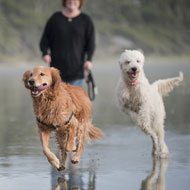Dogs can copy each other's expressions, study finds

Dogs who knew each other well tended to mimic each other most.
Dogs can mimic each others expressions, a study by the University of Pisa has found.
Published in the journal Royal Society Open Science, the results suggest that dogs may be capable of empathy.
The ability to convey emotion is a basic human form of empathy that makes individuals able to experience the emotions of others.
In human and non-human primates, this can be linked to facial mimicry - an automatic and fast response (less than a second) in which individuals mimic others' expressions.
In the study, the researchers filmed interactions between 23 male and 26 female dogs, ranging in age from just three months to six years.
Afterwards, they analysed the video and found that the dogs engaged in two types of mimicry during play - bowing using just their front legs, and opening their mouths in a non-threatening way.
They found that dogs who knew each other well tended to mimic each other most, while those that did not know each other mimicked the least.
"Our results demonstrate the presence of rapid mimicry in dogs, the involvement of mimicry in sharing playful motivation and the social modulation of the phenomenon," the researchers say.
"All these findings concur in supporting the idea that a possible linkage between rapid mimicry and emotional contagion (a building-block of empathy) exists in dogs."



 The RCVS has announced a new version of its 1CPD mobile app, with enhanced features for veterinary surgeons and veterinary nurses to record their continuing professional development.
The RCVS has announced a new version of its 1CPD mobile app, with enhanced features for veterinary surgeons and veterinary nurses to record their continuing professional development.